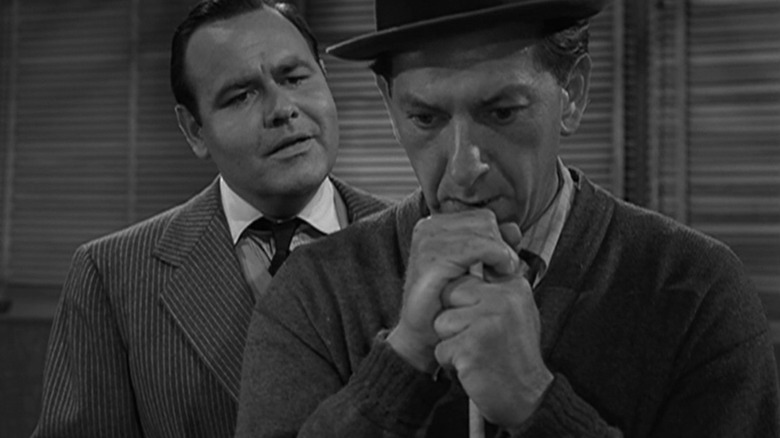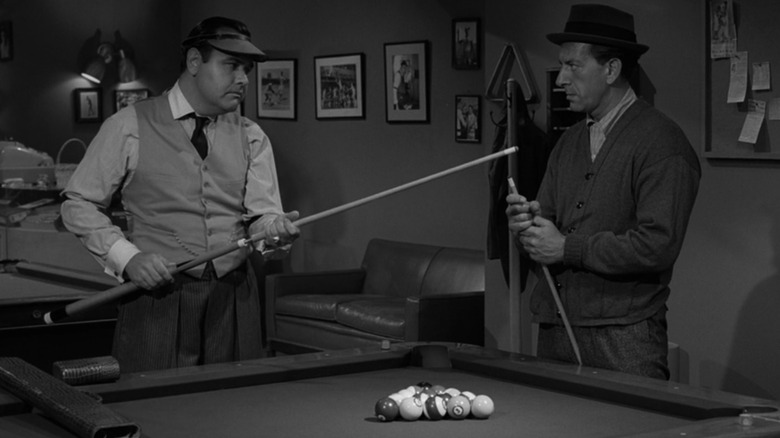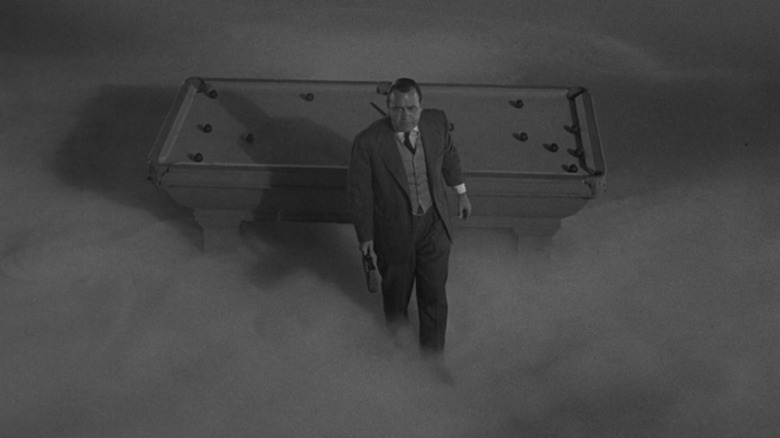Jonathan Winters Hid His Twilight Zone Anxiety With Some Absolutely Wild Improv
In the "Twilight Zone" episode "A Game of Pool" (October 13, 1961), Jack Klugman plays a would-be pool champion named Jesse who feels that he would be more widely recognized for his billiard skills, were he not living in the shadow of the late pool champion James Howard "Fats" Brown. Jesse posits that if he had had the opportunity to play against Fats, he would definitely win. In a supernatural twist, Fats (Jonathan Winters) arrives from the afterlife to accept the challenge. The ensuing game, however, comes with a stipulation: if Jesse wins, he will indeed be granted the lifelong reputation as the greatest pool player of all time. If he loses, he'll die in obscurity. Jesse accepts.
Throughout their game, Fats points out that living well and happily is more important than the hard-edged fame of being a great pool player. Jesse doesn't listen. He wants fame.
Jesse, perhaps shockingly, wins the game. His wish is granted and he gains the reputation he always felt he rightfully deserved. The ironic twist lies ahead, however. After Jesse dies, his reputation secure, other ambitious pool hall bums begin positing that they could have beaten Jesse if they had been given the chance. Jesse is now locked in a seemingly endless cycle of supernaturally challenging any would-be pool champion who evokes his name. The ghost of Fats, meanwhile, retires to go fishing.
Winters, ordinarily a versatile comedian, felt out of his element filming "A Game of Pool." The episode's director, Buzz Kulik, was interviewed for Marc Scott Zicree's book "The Twilight Zone Companion," and he recalled how nervous Winters was on set. Winters, it seems, flubbed a few lines and hated his unprofessionalism. Luckily, the comedian got through the shoot with his uncanny talents for endless improv.
Get me a Jonathan Winters type!
Jack Klugman was a long-working actor who was used to the fast pace of TV. Indeed, he would ultimately appear in four episodes of "The Twilight Zone." By 1961, Klugman had also starred in several notable feature films — including Sidney Lumet's "12 Angry Men" — and about 24 episodes of various TV shows (in addition to having a prolific career on the stage). Klugman was in his element. Winters, however, was more comfortable with extemporaneous comedy programs, having starred in his very own "The Jonathan Winters Show" in 1956 and 1957. He did impressions and standup and was clearly not comfortable playing a character like Fats.
Kulik, in Zicree's book, explained that he wanted a performer to provide a quality that would counter Klugman's determined professional intensity. A comedian, he felt, would fit the bill perfectly. In his own words:
"With a guy like Jack Klugman, you go out and get Jack Warden or somebody like that. However, we determined that here was this guy who was such a brilliant talent, who would bring a kind of freshness, because this was his first time as a dramatic actor. He'd never even been on film before."
Jack Warden also appeared in "12 Angry Men," as well as notable films like "From Here to Eternity," "Run Silent, Run Deep," and the 1959 adaptation of "The Sound and the Fury." Warden and Klugman could certainly have matched each other in dramatic power. But that wasn't what Kulik wanted. He wanted Winters.
Winters acts!
Once Winters was cast, though, the comedian had to suddenly contend with the fact that he'd have to do some serious dramatic acting. Kulik recalled:
"[Winters] was very anxious to do this well [...] and yet he was kind of embarrassed because he felt, 'My God, here are all these professional people, this crew and cast, and here I am.' And not only did he have to work his dialogue but he had to play pool! So, whenever he'd blow a line or make a mistake, in order to cover his embarrassment he would go on for like 10, 15 minutes, in the character, doing some of the wildest, funniest, most marvelous things you'd ever seen."
Go with what works. Winters was a comedian and Kulik knew that letting him be funny, to feel like he could ply his talents, likely put him at ease. It seems that everyone got to the end of shooting without any notable delays or problems.
It seems that none of Winters' improvizations made it into the final cut, sadly, and Kulik didn't relate any specifics of those wild, funny marvelous improv sessions he referred to. But readers familiar with Winters' work can imagine the hilarity at hand. Winters was a chameleon, and it's likely he did a few impressions on set.
"A Game of Pool," it should be noted, aired only one month after Robert Rossen's excellent poolhall drama "The Hustler" was released, and one might want to think that Winters did his best impersonation of Jackie Gleason, who plays a character named Minnesota Fats in that film. "The Twilight Zone" was clearly riffing on "The Hustler," albeit with a supernatural twist.


